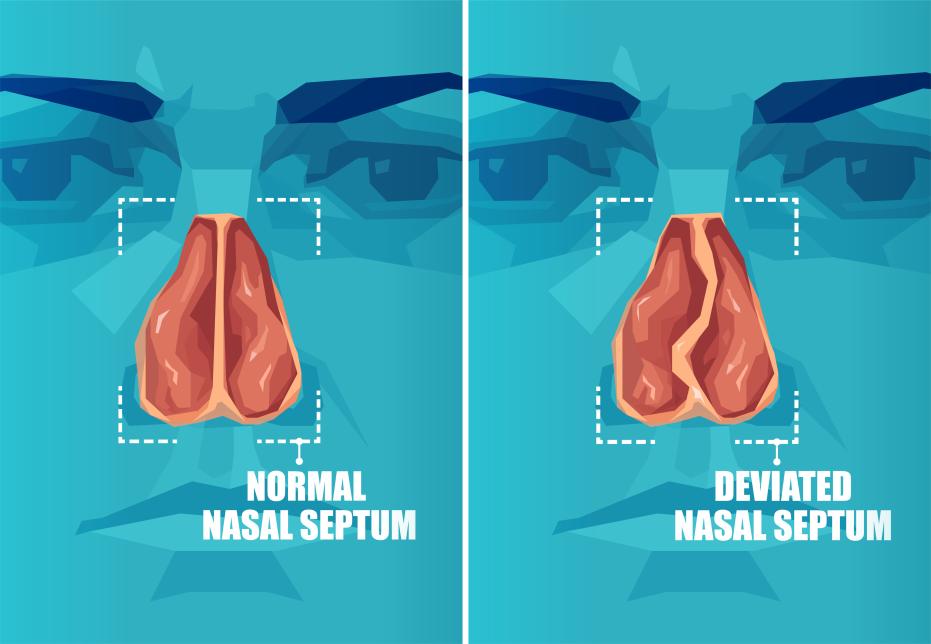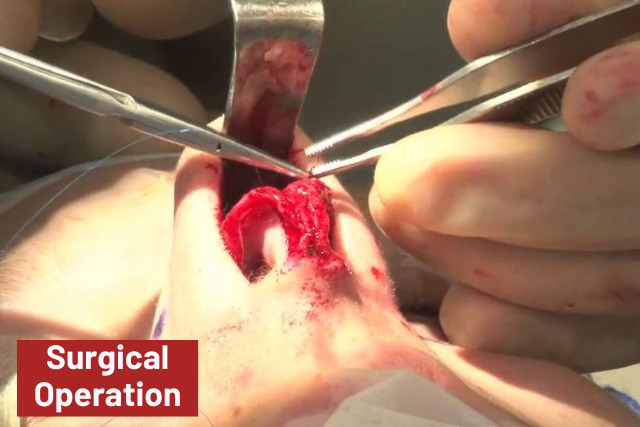
Are you experiencing problems and difficulties related to your nose? Most likely, your doctor may have advised you to take decongestants. However, if your family doctor finds out that you have a deviated septum, they may refer you to an ear, nose, throat (ENT) specialist for proper diagnosis and treatment.
Deviated septum usually occurs during fetal development and is also common among persons involved in car accidents and strenuous contact sports, such as basketball and football.
This happens when the septum is pushed towards the other side of the nostrils and may heal in that position, causing breathing difficulties due to partially blocked airways.
However, even people suffering from deviated septum may have no idea about it. To keep you properly informed, here are some symptoms that may lead to deviated septum:
- Intense nasal blockage on one side
- Nasal congestion
- Sinus infections, which may be resistant to medications
- Postnasal drip
- Sleep apnea
- Heavy and intense snoring
- Whistling noise when breathing with the nose
- Facial pain
- Crooked nose
- Frequent nosebleeds
- Breathing noises during sleeping
There are instances where people often mistook these symptoms like allergic reactions or common colds. However, if you’re experiencing these symptoms frequently, it would be best to call your doctor immediately, especially if other symptoms, such as dizziness and confusion, occur.
What Is Deviated Septum: Signs, Causes & Treatments
Treatment Options
How to treat Deviated Septum? In most cases, your doctor may advise you to take medications to relieve the symptoms. But if these symptoms worsen, your doctor may require you to have surgery, such as balloon septoplasty for deviated septum. The treatment may depend upon your diagnosis:
1. Over-The-Counter Medications

Suppose you’re experiencing mild and manageable symptoms. In this case, your doctor may prescribe over-the-counter medications and prescriptions, such as decongestants, nasal steroid sprays, and antihistamines.
But remember, these medications do not heal the root cause of pain and may only provide temporary relief.
-
Nasal Steroid Sprays
These steroid sprays may help reduce nasal inflammation, nasal passage swelling, and drain the congested area, opening the obstructed airways. However, results do not happen in an instant.
It may take one to three weeks to reach the maximum effects of nasal sprays. That’s why it is crucial to follow every instruction your doctor will tell you as much as possible.
-
Antihistamines
The primary role of antihistamines is to treat allergic reactions for Deviated Septum, including congested and runny noses. However, there are instances where these medications help non-allergic symptoms, such as those connected with common colds.
Furthermore, these medications are not advisable if you perform physical activities that require coordination, such as driving or operating heavy machinery, as some antihistamines may cause drowsiness.
-
Decongestants
However, it’s recommended to use nasal decongestant sprays with caution. These could make you drug-dependent and may worsen your symptoms once you stop using them.
The primary role of decongestants is to reduce nasal swelling to keep both of your airways open. These could be in a form of nasal spray or pill.

Also, be careful when taking pills or oral decongestants, as it contains a stimulant that may increase your heart rate and blood pressure abruptly.
2. Surgical Operation

Unlike prescribed medications, surgery will address the root cause of the problem by reshaping or correcting your deviated septum.
Usually, surgery is the last option if the medication seems not to be working anymore. The common surgical procedures concerning deviated septum are septoplasty and rhinoplasty.
-
Septoplasty
Septoplasty is a process that straightens and corrects the positioning of your Deviated Septum. Your doctor may perform this by trimming excess cartilage, bone realignment, or bone or cartilage replacement. However, septoplasty is only required if the condition badly affects your quality of life.
Whether basic or not, all surgical operations have risks that everyone needs to consider. If you’re planning to undergo septoplasty, here are some risks you may experience during or after the surgery:
- Bleeding
- Nose deformation
- Numbness of the upper gum, nose, or teeth
- Temporary loss of smell
- Nasal obstruction
After the surgery, never blow your nose too much, or perform strenuous activities, such as running, for several weeks. This may help you prevent possible nosebleeds.
Also, avoid using t-shirts or clothes that pass over your head, and make sure to elevate your head when you sleep. This will help your wound heal faster.
-
Rhinoplasty (Deviated Septum Surgery)
Rhinoplasty is surgery for altering nose shape and size. Everyone who wants to change the appearance of their nose may undergo this operation. However, it would be best to consult your doctor first if it’s the best procedure for your condition.
In the case of a deviated septum, rhinoplasty will reshape or resize the affected bone and cartilage. However, there are some risks that may occur during and after the procedure, such as:
- Bleeding
- Infection
- Breathing difficulties
- Numbness around your nose, which could be permanent
- Scarring
- Need for another operation
Final Words:
According to experts, around 80% of people have slight deformations in their septum. However, this doesn’t mean that these people need surgery. As mentioned above, you are only required to undergo a surgical operation if your condition is severe and affects your daily life.
Most of the time, many people may experience mild symptoms, which are not unusual. However, certain medications would still be needed to alleviate the symptoms. If these symptoms worsen, call your doctor and request an appointment. It would be better to be safe than sorry.
